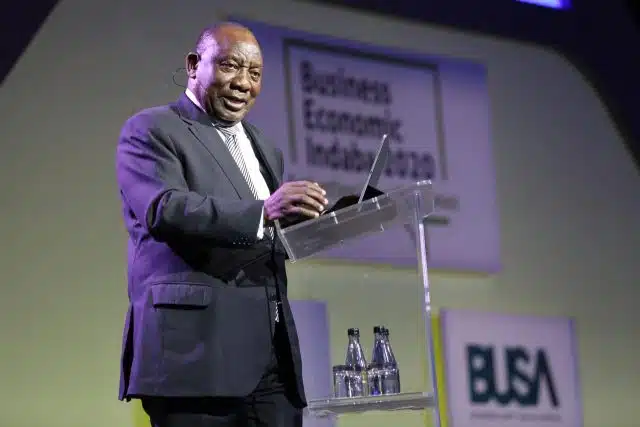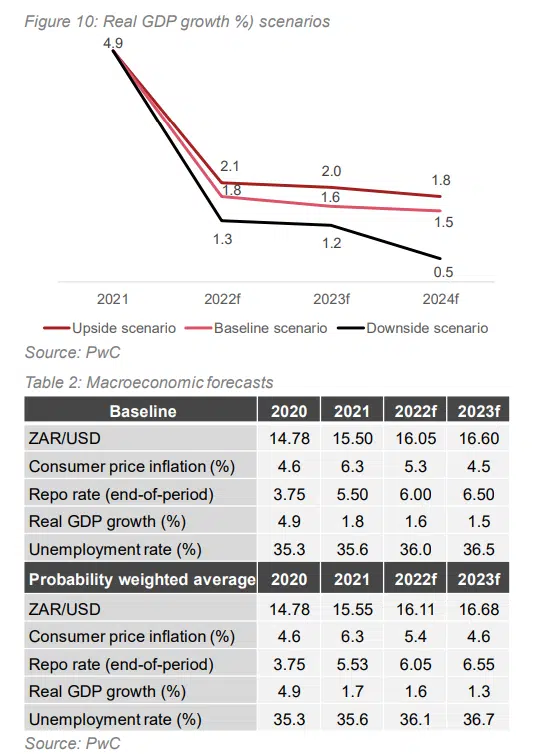
3 load shedding scenarios for South Africa – and why CEOs have sent an urgent letter to Ramaphosa
As South Africa continues with another day of stage 6 load shedding, economists have warned that the continued power cuts will contribute to prolonged low-economic growth in the country.
Despite progress on some structural economic reforms in recent years, South Africa’s electricity supply situation has shown no improvement, professional services firm PwC said in a research note on Thursday (30 June).
The group said three of the goals still facing a critical challenge include:
- Improving the Energy Availability Factor (EAF) to over 70%;
- Implementing the emergency procurement of 2,000MW of generating capacity;
- Addressing institutional inefficiencies in municipal electricity distribution.
PwC’s baseline scenario assumes that little progress will be made on these three factors.
“While power purchase agreements for three projects with a capacity of 150MW were signed in early June, this power will only start to materialise in 2024. At the same time, Eskom’s EAF dropped to 61.2% in the third week of June, with three-quarters of outages due to unplanned breakdowns.
“The low EAF and unreliable supply of power is the primary constraint on faster economic growth and will limit medium-to-long-term potential growth to around 1.5% per annum.”
By comparison, prolonged load shedding will lead to a downside scenario where South Africa’s GDP growth falls to just 1.2% next year, the firm said.
“That will be below the population growth rate, resulting in a decline in real GDP per capita. South Africa recorded seven straight years of declining real GDP per capita during 2014-2020.”
PwC’s upside scenario for 2022 assumes a 10% reduction in load shedding compared to the baseline. This would mean a markedly improved power situation in H1 2022. In 2023, the upside scenario assumes a 20% decline in load shedding compared to the baseline.
Other positive factors supporting our upside scenario into next year would be a slower increase in interest rates, a smaller depreciation in the rand slowing the pace of imported inflation, and an improvement in business confidence in 2023 following the finalisation of the African National Congress (ANC) leadership elections at the end of this year.
Other external factors are also assumed to be more favourable, including improved soft commodity export volumes from Ukraine.
A letter to Ramaphosa
The dire energy situation this week situation has led to business leaders sending an urgent letter to president Cyril Ramaphosa, calling on him to urgently “debottleneck regulatory processes” to assure the security of supply, New24 reports.
“Unfortunately, efforts to this end over many years have either failed or not gone far enough to resolve the underlying challenges: operational, financial, and structural afflicting Eskom and the broader energy ecosystem. Urgent action is now required, and we appeal to you as president of the country to act firmly and decisively to address this national crisis,” the letter states.
Business leaders pointed to two of the biggest blockages: the time it takes to complete environmental impact assessment approvals and the difficulty of obtaining grid access from Eskom.
Business Unity SA (Busa) said that South Africa’s move to stage 6 load shedding will have a significant impact on all parts of the economy.
“The implementation of stage 6 load shedding is a serious blow to an economy that is already struggling with low growth and a lack of decisive action on the part the of government to make the necessary interventions to attract investment and put the country on a sustainable and inclusive growth path,” said Busa chief executive Cas Coovadia.
He added that the power cuts are likely to lead to small and medium businesses buckling under the pressure of managing an untenable situation.
“We must stress that while this is a serious and negative impact on the economy. We have been urging the government for numerous years to remove all barriers to private sector intervention in the generation of energy and power, but it is only recently that the government has heeded these considerations.”
Alexforbes chief economist Isaah Mhlanga said Eskom’s prolonged stage 6 load shedding has already caused significant damage to the country’s economy, with over R4 billion wiped from the GDP for each day it continues.
Speaking to Moneyweb radio on Thursday, Mhlanga said this means the economy suffered a R12 billion blow – at least – between Tuesday and Thursday this week. Eskom has already confirmed that stage 6 load shedding will continue on Friday evening.
Read: Stage 6 load shedding costs South Africa over R4 billion a day: economist




